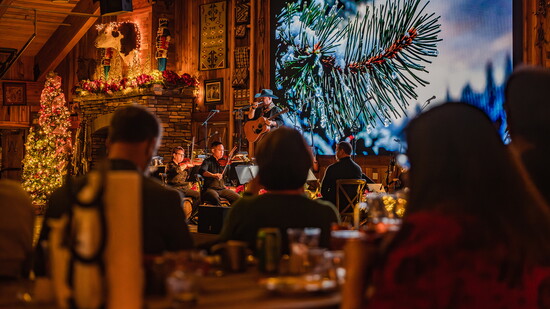“We were the cowboys”
Music has always been a means of storytelling. Cowboy and Western music is no different; it is the tale of the West.
“Across the prairie we did ride, lasso and pistol by our side”
Before the proliferation of railroads, the only means of transporting cattle to eastern markets was the cattle drive. Ten to 15 cowboys would work to drive 2,000 to 4,000 cattle up to 1,000 miles over the course of three to five months. The hours were grueling, often being astride their horses from before sunrise to after sunset.
“We'd ride until the blazing sun was going down, the range our holy ground”
The work didn’t stop when the sun went down. After a full day’s work, cowboys would then take turns in shifts overnight to make sure the cattle were calm as stampedes were a constant threat. As cattle are prey animals, they have an acute sense of hearing and are often jumpy around sudden, loud or unfamiliar noises. A rustling bush or a snapping twig could be catastrophic for the cowboys and the herd.
“Our song was born out on the trail, where water sings and hot winds wail”
To mask these noises, cowboys would sing, whistle or play music. Keeping in mind that a song is three to five minutes long, and there are 91.3 days in three months, with 1,440 minutes in a day, that equals roughly 131,472 minutes or about 32,868 songs, to provide background music for more than two million pounds of cattle. It likely also supported the cowboy’s mental health, offering entertainment and a sense of community during long months on the trail.
“We sought eternity out underneath the stars, our story in our scars”
American history tells the story of immigrants seeking a better life for themselves and their descendants—often starting with jobs few wanted but still had to be done.
Early cowboys were a mix of ethnicities including Scottish and Irish immigrants. This led to a strong Celtic influence in the music. Essentially, it comprises a major chord structure, focused on modal melodies. The harmonic ambiguity allows performers to use slightly different chords while still sounding correct. It is cheerful, with a touch of melancholy or edge as experienced in introspective, soulful or bittersweet moments and is now used more recently in modern rock, blues or funk music. The narrative nature of the songs tells stories often attached to strong emotion. These songs are well-suited to a fiddle and guitar—instruments that thrive on simplicity and flexibility. With more than 30,000 songs to sing in one cattle drive, and multiple drives over the years, Cowboy and Western music have increasingly incorporated four- and five-part harmonies to ornament their songs.
“They'll always sing of the legend of our song, across the night sky we ride on...”
Since 1957, the Flying W Wranglers have preserved the music of the western landscape and ranch life. Formed four years after the Flying W Ranch opened to tourists, the group has serenaded guests over chuckwagon dinners for decades. More than 60 performers have been part of the band’s legacy.
Today, the Wranglers are composed of five members: Michael Amidei, Bobby Edwards, Luke Tripp, Adam Gardino and Brian Chomka. Together they combine vocals, guitar, piano, drums, fiddle and bass to create their iconic sound.
With 150-180 shows a year, these guys get to “wake up and think about music,” Amidei explains. “This is a calling for us. We are not just going through the motions; we love keeping this music alive… and the challenge of connecting it with the current audience.”
The quality of music presented at these dinners might surprise guests. The current band consists of internationally recognized talent with backgrounds in orchestral arrangement as well as recognizable musical instinct and capability. Their chemistry is evident in their collaboration and in the natural humor that comes from a strong foundation and bond within a unified purpose.
“We are in a moment where tradition matters, but only we can choose to carry it forward,” says Amidei, reflecting on the joyful weight of 72 years of Flying W history and the generations of Western tradition the performers carry with them each time they step on stage.
During the season when tradition takes center stage, Flying W Ranch prepares for its Cowboy Christmas Jubilee. Under twinkling lights, the Chuckwagon Supper gets gussied up to host two daily shows featuring a 13-piece orchestra alongside the beloved Flying W Wranglers, celebrating heritage with festive music and clean humor.
Make your reservations soon, as shows are expected to sell out.
Address + Phone: 3330 Chuckwagon Rd | (719) 598-4000
Website: https://www.flyingw.com/
Facebook: @FlyingWChuckwagon
Instagram: @FlyingWRanch_CO
